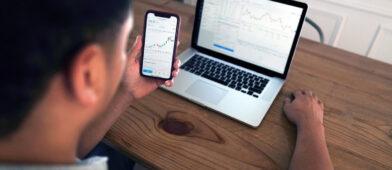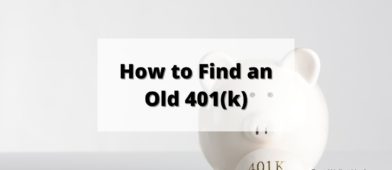It's easy to tell people that they shouldn't react emotionally when they're investing. Don't sell when you're scared and don't buy when you're excited. Leave the emotion out of it.
And I've written those same things over and over again because it's good advice.
But knowing not to do something logically is not the same as knowing it when you're in the emotional soup that is daily life.
One of my biggest investing mistakes was doing just that – reacting emotionally.
During the pandemic, with all of our kids home, I sold some of our stock investments because I was scared. I did it in a way that resulted in no tax impact, I sold some winners and offset the capital gains by selling losers as well.
I told myself I was taking money out of the volatile markets and making sure we had a cash cushion. That was accurate. As a small business owner with uncertain cash flows, it was true.
But what prompted the move was fear. I justified it with a logical explanation.
That's the challenge with any type of decision making, it's rarely done when things are normal and you've had a good night sleep.
It's hard to catch yourself making a mistake in the moment.
It was a freaking pandemic.
I kept my cool during financial meltdowns. I didn't make the same mistake during the Great Recession as major financial institutions went under and the federal government had to step in with a Trouble Asset Relief Program. At the time, we thought the entire financial system was going to collapse.
The difference was that my life was not being upended at the same time.
The pandemic meant all four of our kids were home. It was also an airborne disease that had us wiping down our groceries and having little outside contact. We were worried for the health of our parents, who were more susceptible and unlikely to get treatment at packed hospitals.
The hospitals starting putting beds in the parking lots. And I had friends who lost their parents to COVID-19.
And on top of that, the markets were cratering as everything shut down and commerce stopped.
So yeah, don't make emotional decisions when you're investing but good luck given those situations.
You can justify your decision later using logic.
It was easy to justify my decision logically. I run a business and it's likely business revenue would go down, so I wanted to extract some cash from the only source I had – our investments. I sold winners and losers to limit the tax impact and build up a cash cushion.
But what prompted the decision was fear. I was fearful because my kids were home and people were dying. Hospitals were at above maximum capacity.
In the end, the mistake will only cost us capital gains that we've missed out on. We ended up needing some of the cash but we never put the money back in as a lump sum later on. I did continue are regularly monthly contributions (I never touched that automated transfer) so the damage was limited, but still there.
It's easy to do the right thing when times are good.
I consider myself financially savvy. I even have proof that this type of emotional reaction isn't common. I've lived through the housing bubble, the Great Recession, and even this latest round of tariff induced volatility.
But I also know that I'm susceptible.
Which means I need to put systems in place to avoid this and other similar errors.
Here's what I have in place to avoid this in the future
I automate our investments. We have regularly scheduled contributions into our investment accounts for both our 401(k) as well as a taxable brokerage account. This system has been in place for nearly twenty years and acts as a floor for how much we invest each year.
Something that is automated means it will not get forgotten. I try to automate as much as I can.
I need to talk to someone before I make major changes. I always discuss major decisions with my lovely wife but I know for certain in this case she would've trusted my judgment. She's savvy but it was a difficult time for everyone and I don't think she would've been fully invested in thinking through the decision anyway.
This is one of the reasons why people use a financial advisor that manages their investments for them. It's an intermediary that you have to discuss decisions with before making them. It also adds an extra step, which in this case is a benefit.
Gain a better understanding of actual needs. I predicted a future with lower income and then sought to draw on sources of cash. I should've looked at our spending using a budgeting tool, reviewed our emergency fund, and realized that we had at least a year of cushion already.
The S&P recovered from the pandemic's fall within months. We remember the pandemic as a multi-year situation but the impact on the stock market was only a few months. If I had done this careful analysis, the market would've recovered before we would've needed the cash.
While there is no guarantee that the recovery was going to be that fast, I should've waited until we needed the funds to start selling.
Review my risk tolerance. I'm in my mid-forties, which the “120 minus age” says I should have 75% of our investments in equities. I know our blend is still closer to 85% and perhaps I'm unable to stomach that volatility in times of turmoil and personal stress.
That, of course, that portfolio allocation is just what I have in our portfolio and doesn't consider our cash, so I have to look at our Empower Dashboard with our Net Worth to really see the breakdown. That's not something I did.
As my dad and other mentors have told me for ages, “slow down.”
When I feel panic and pressure, the takeaway is that I should slow down and start writing and thinking rather than doing.
Measure twice and cut once. Or in this case, don't cut.
What was your biggest investing mistake?




Yes I can relate with the whole pandemic scenario. I used to get emotionally moved into action and it was not always the best decision, however I’m much older and cannot afford to wait for recovery time. The stock market is not for me, I have placed my money in some real estate, some HYS and some other dividend paying options. I do not fear the uncertainty of the future (I’m 64) I feel I can live within my means, my children are successful and they do not need me, they will take care of me if need be. Your… Read more »
As you near retirement, which is when you need that nest egg, you are correct – you can’t wait for things to recover.
Thank you for the kind words Cynthia!
When times are bad, do NOT LOOK! I have been through Tech bubble, Real Estate bust, Covid and other bad times. Grew up in the hyperinflation of the late 70’s and early 80’s. When times are bad, just put your head down and do not open a statement. I did not look for two years in 2008-10. You know its bad, but you are buying on the cheap. Just sit on your hands and do NOTHING, per Jack Boggle! IF your plan is good, you will be fine. Life is full of teaching moments, learn and move on or keep… Read more »
You’ve been through a lot! I agree though, when times are bad (especially if things are OK for you), don’t look!
Let me tell you about my first hugh invest mistake. It was about 55 years ago and my first venture into the stock market. I picked a company called Sunshine Mining. At the time the largest silver miner in the country. Silver had been down substantially and was only 2 or 3 cents from where the government was committed to support it. Seemed like the perfect low risk investment. What could go wrong? The very next morning headlines screamed “40 miner die in mine fire”. You guessed it was Sunshine Mining’s largest mine. The stock went down 90% that day… Read more »
Oh my goodness… that’s just bad luck for everyone involved!
I always say that we should invest our money from a third-person perspective. As you rightly pointed out, emotions often cloud our judgment when it comes to investing, which increases the chances of making costly mistakes. Treating our money as if it belongs to someone else can help us stay objective and make more prudent decisions.
That’s a great way to think about it, if you can manage!